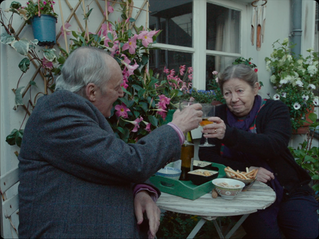I'm Hungry, I'm Cold
- Jessica Moore

- Jun 14, 2021
- 2 min read
Updated: May 11
Chantal Akerman, 1984

Two ravenous young women wander the streets of Paris in continual forage, looking to remedy their destitution. A borrowed apartment offers them rest. A diner, some bread and cigarettes. Together, they visualise a hazy ritual of consumption, falling in and out of sync with every mouthful.
I’m hungry, I’m cold. A signature of Akerman’s Saute ma ville, the women’s dialogue is dissonant. Their repetitive back-and-forth, laden with commentary on their hunger and fatigue, is an unnatural mode of speech, evoking a conversation with oneself, a confession under one’s breath. It is precisely the circularity of their dialogue that reveals the women’s oneness, a unity made visible as they kiss and huddle under shelter. They pace through their surroundings as if connected by an invisible thread. Their desires thrum between them; their hungry words scale the sides of cars and buildings.
Perhaps in reference to Chytilová’s hedonistic Daisies, the women coquettishly serenade a crowded restaurant. Some men are tempted by this display, or rather, they pity the poverty that undergirds its exhibition. They buy the women dinner. Off-screen, the women accept the invitation to stay with one of the men. There, one of the women loses her virginity; the other fries eggs. The respective acquisition of sex and food marks the women’s only division, though neither satisfies. Their separation attracts little more than nugatory transactions with passing strangers. At least together there’s empathy, their emotions are split down the middle.
Arm in arm, spiritually enlaced, the women leave the apartment and wander onward into the dark. All they need is each other, at least for tonight. Akerman’s camera hangs back, resisting finality. Emptiness fills the frame. Perhaps nothingness begets possibility. I want to fall in love—Me too, come on.








Comments